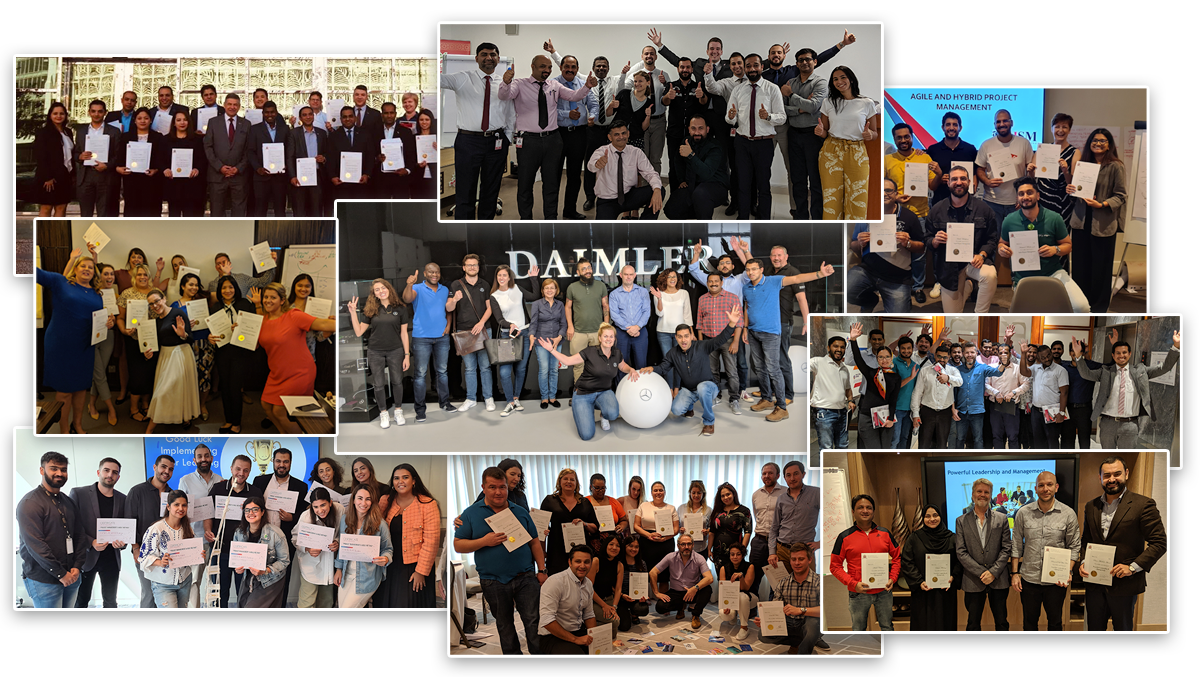Workplace stress is a common challenge that many professionals face. It often results from high workloads, tight deadlines, or conflicts in the workplace.
Not all stress is bad. Short-term stress can enhance focus and motivation. However, prolonged or unmanaged stress can negatively impact productivity, well-being and job satisfaction.
Recognising workplace stress signs and causes helps you manage it and maintain work-life balance.
This article explores workplace stress, its symptoms, and practical ways to manage job stress before it leads to burnout.
Why Trust ISM Training?
Over 20,000+ graduates
Have advanced their career with ISM Training
89%
of ISM graduates say our course helped them get a promotion.
76%
said that their training helped then increase their salary.
97%
of graduates want to study more of our courses.
Our graduates are working in some of the biggest companies worldwide, companies like...






What is workplace stress?
Workplace stress is the feeling of pressure caused by professional demands that exceed your ability to cope. It can be caused by workloads, tight deadlines, or workplace conflicts.
When faced with pressure, your body releases stress hormones, triggering the “fight or flight” response.
In short bursts, this response can enhance focus and performance, helping you meet challenges. However, prolonged exposure to stress can prevent your body from resetting, leading to chronic stress and burnout.
Some workplace stress can be motivating. This includes taking on new responsibilities, leading a project, or starting a new job. However, excessive or unmanaged stress can negatively impact productivity, well-being, and overall job satisfaction.
What are the signs of stress at work?
Workplace stress can affect both your mind and body. It is important to recognise these symptoms so you can take steps to address them:
- Difficulty sleeping (insomnia)
- Frequent headaches
- Increased reliance on alcohol, caffeine, or unhealthy coping mechanisms
- Anxiety or persistent worry about work
- Loss of motivation or engagement in tasks
- Difficulty concentrating or making decisions
- Feeling irritable and easily frustrated with colleagues
- Muscle tension or unexplained physical pain
- Frequent feelings of being overwhelmed or undervalued
Ignoring these signs can lead to burnout, reduced performance, and long-term health complications.
Start your course today!
We offer a comprehensive curriculum that covers all of the essential topics. Our experienced instructors will provide you with the support and guidance that you need to succeed.
Why am I feeling stressed at work?
There is no single cause of workplace stress, as it varies from person to person.
If you find your job stressful, you are not alone. According to Ciphr two-thirds of employees reported experiencing job-related stress in 2024. They were caused by factors such as workload, bosses, colleagues, working hours, commuting, or workplace culture.
Common workplace stressors include:
- Heavy workloads and unrealistic deadlines
- Lack of control over tasks or decision-making
- Conflicts with colleagues or managers
- Unclear job expectations or shifting priorities
- Lack of job stability or fear of redundancy
- Poor work-life balance and time management skills
- Lack of recognition or support from leadership
Workplace stress can also spill over into your personal life, making it difficult to relax and recharge.
Identifying your stress triggers is the first step in managing them effectively.
We let our graduates do the talking...
Identifying workplace stress triggers
If you are unsure about what is causing your stress, keeping a work stress diary can help.
Each time you feel overwhelmed at work, note the following:
- The time, place, and date of the stressful situation
- What task you were working on
- How you felt physically and emotionally
- What thoughts were running through your mind
- Who you were interacting with
- How intense the stress felt on a scale from 1 to 10
Over time, patterns may emerge. You might find that certain meetings, tasks, or interactions consistently trigger stress.
Once identified, you can take proactive steps to address these stressors. For example, stress and time management often go hand in hand, so improving your time management skills will likely help you feel less stressed.
By recognising and addressing workplace stress, you can improve both your professional performance and overall well-being.
Looking further ahead?
View our course calendar in full
Strategies for managing stress in the workplace
If you experience work-related stress, there are strategies you can implement to improve your well-being.
Find ways to relax
There are many ways to incorporate stress-relieving activities into your workday. Unfortunately, some people turn to harmful coping mechanisms, such as excessive alcohol consumption.
Focus on mindfulness and healthy activities to reduce stress and boost well-being.
Some effective stress-relieving activities include:
- Breathing exercises
- Speaking with a friend
- Staying active
For more stress management strategies, read our full guide.
Make your work environment work for you
Sitting in the right position is more important than you might think.
If you have an uncomfortable chair or a desk that is too small, speak with your boss. Poor posture can lead to long-term health problems. This can make work painful and limit your ability to enjoy relaxing activities outside of work.
If you work in a loud environment and struggle to focus, invest in noise-cancelling headphones.If the room temperature is uncomfortable, adjust your clothing, use a desk heater, or bring a fan.
An uninspiring office can also affect your mood. Adding plants or small decorations can make your workspace feel more inviting.
Enhance your organisation skills
A lack of organisation can be a major source of stress.
Here are some ways to improve your organisation skills:
- Make a realistic to-do list
- Establish a structured work routine
- Tag emails to prioritise them
- Keep your workspace organised and clutter-free
- Use folders to maintain a clean and efficient digital workspace
By implementing these simple strategies, you can reduce stress, stay focused, and work more efficiently.
Take regular breaks
When working on reducing workplace stress, remember to take breaks.
Step away from your work to grab a drink, go to the bathroom, send a message to a loved one, or simply look out the window.
If possible, physically step away from your desk to change your environment.
Even if that is not possible, a short mental break can still help—sometimes, just a few deep breaths can make a difference.
Learn how to say ‘no’
One common source of stress is taking on too much.
If you always say ‘yes’ to everything, you may become overwhelmed with unrealistic workloads, leading to burnout. Set clear boundaries between work and personal life. You should not feel obligated to answer emails late at night or while on vacation.
Likewise, respect your colleagues’ boundaries by avoiding work-related messages outside of business hours.
Talk to your manager
Remember, it is in your employer’s best interest to have happy, productive employees.
According to the University of Oxford, happy employees are 13% more productive.
If many employees at your company are experiencing similar stress levels, management may consider implementing a stress management programme.
Stress management for leaders
If you are in a leadership role, you not only manage your own stress but also help guide your employees in handling workplace pressures.
For more insights, read our guide on leadership and stress management.
Mastering workplace stress with ISM
Managing job stress effectively is essential for maintaining productivity and well-being.
ISM’s stress management course equips employees with practical strategies and time management techniques to handle workplace challenges.
By prioritising tasks, setting realistic deadlines, and avoiding procrastination, participants can manage their workload, reduce stress, and prevent burnout.
These techniques not only enhance efficiency but also contribute to a healthier, more balanced work life.
ISM has been a trusted training provider in the UAE since 1998. We equip professionals with proven stress and time management skills tailored to the region’s unique business landscape.
Take charge of your well-being today. Contact ISM Dubai to explore our stress management training programs and create a more productive, stress-free workplace.
FAQs
Workplace stress stems from workloads, deadlines, conflicts, lack of control, job instability, and work-life imbalance. Identifying your stressors helps you manage them effectively.
You can reduce workplace stress by:
- practicing mindfulness,
- taking breaks,
- staying organised,
- setting boundaries, and
- improving your work environment.
Talking to your manager about adjustments to your workload or seeking professional support can also help.
Common signs include:
- insomnia,
- headaches,
- anxiety,
- loss of motivation,
- difficulty concentrating,
- moodiness, and
- feeling overwhelmed.
Ignoring these symptoms can lead to burnout and long-term health issues.
There are many ways in which you can improve your work-life balance, including:
- Setting clear boundaries between work and personal time,
- Learning to say ‘no’ to excessive tasks, and
- Focusing on self-care activities like exercise and relaxation.
A stress management course can also help you improve and lead a more balanced, fulfilling life.
If workplace stress becomes overwhelming, consider the following strategies:
- keeping a stress diary to identify triggers,
- speaking to your manager about workload adjustments,
- using stress management techniques such as breathing exercises, organisation skills, and
- seeking professional guidance.
ISM Dubai offers stress management courses designed to provide support and practical tools for managing and reducing workplace stress.
Join 1000's of individuals and teams certified by the Institute of Sales & Marketing

Our trending courses
At ISM, we combine top-tier training courses with industry-leading instructors.
View all coursesTestimonials from Our Valued Clients
Discover the transformative experiences our clients have had with our training programs.
Hear directly from those who have unlocked their potential and achieved remarkable success.

Some other providers courses can be quite a chore! However, I felt fully engaged and excited by all the new selling tools I have...

Daniel Graham

Instead of just telling me what to do, they showed us how to do it as well as why to do it. They used real-life experiences...

Sujit Nair

The training was delivered in an easy to absorb manner and focused on all the key areas...

Paul Baker CFP



